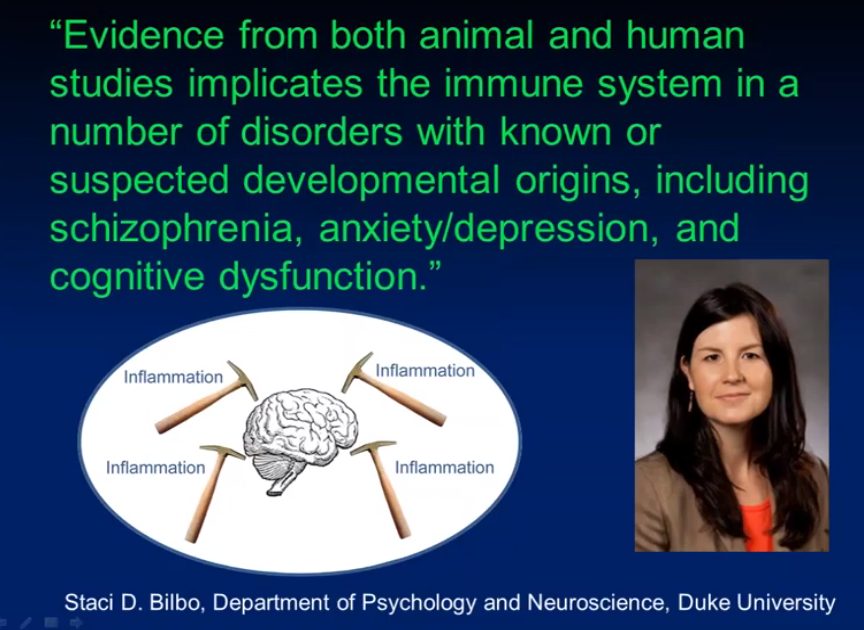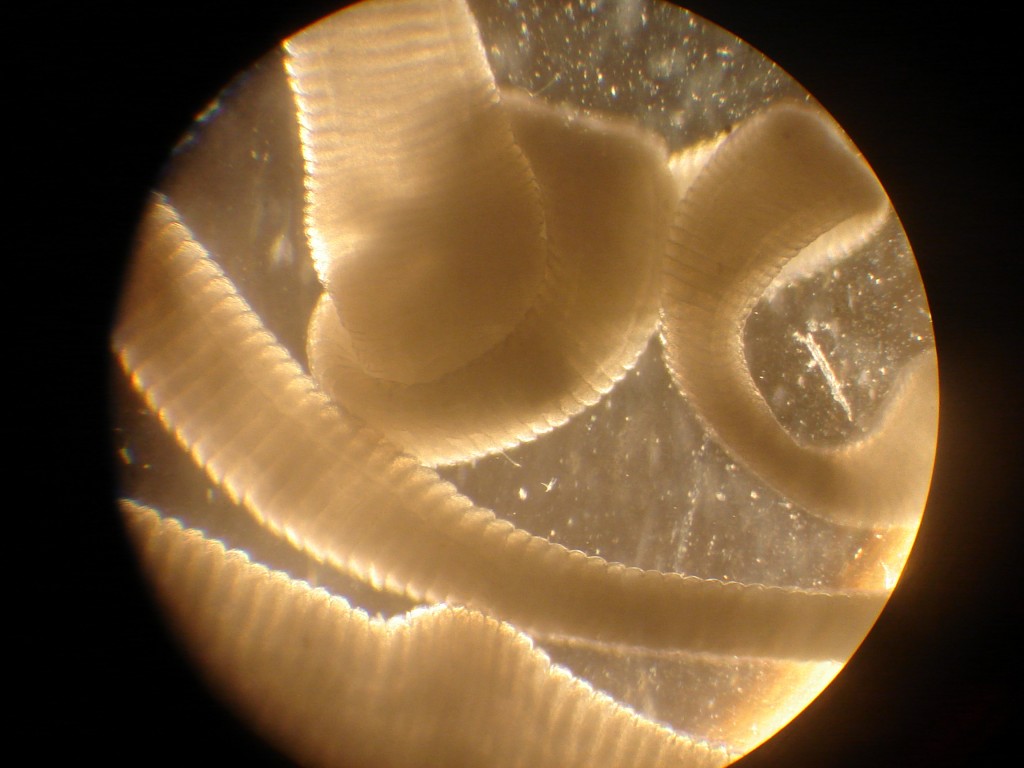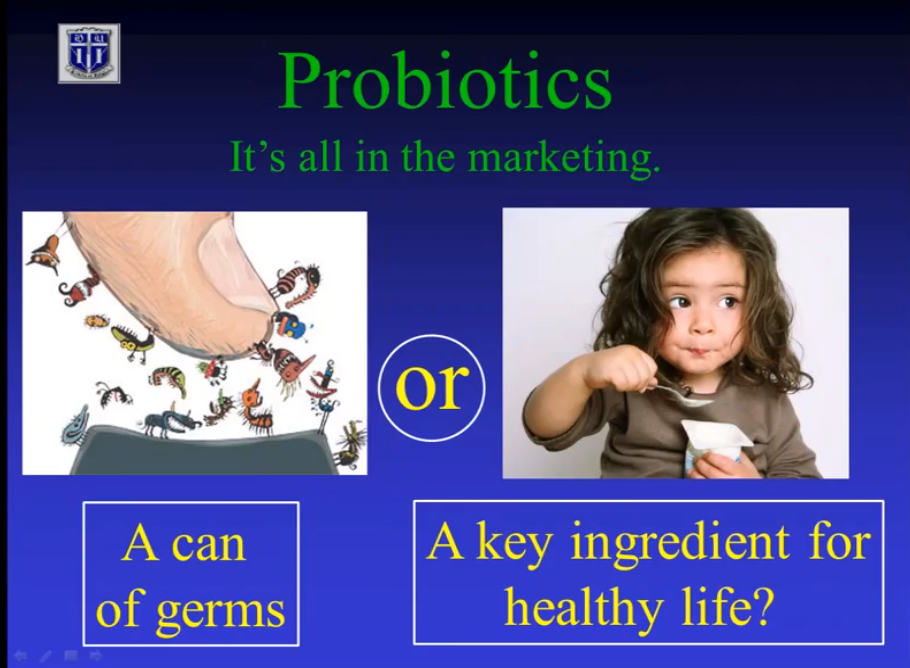By Sallie Bernard, SafeMinds Co-Founder and President
William Parker, Ph.D., an immunologist and associate professor at Duke University School of Medicine, spends his time studying the effects of worms—yes, worms—on rats’ and humans’ immune systems. His worms aren’t the brown kind that live in your garden, but special worms called helminths that might help our kids with autism.
This week Dr. Parker gave a fascinating on-line webinar on biome enrichment, which is the scientific name for what he studies, hosted by the Autism Research Institute.
Thanks in part to the Human Microbiome Project, scientists and researchers are understanding more and more that we human beings are actually walking ecosystems.
Microbes inhabit every part of our human bodies, from our skin to our toenails, and these microbes play a crucial role in our health and well-being.
Our guts, especially, are populated by diverse bacteria, Dr. Parker explains, some of which play a key role in our immune systems, our ability to think, and even in our moods.

The problem, says Dr. Parker and his team of researchers and colleagues, including Staci Bilbo of Duke University, is that some aspects of modern living have led to what scientists calls “biome depletion.”
What is biome depletion?
Biome depletion is the loss of biodiversity from an ecosystem. In the case of humans, we have actually lost complex organisms, like helminths and protozoans, from our human ecosystems.
“We know there are several factors that derail the immune system in modern culture,” Dr. Parker, who has published over 100 peer-reviewed scientific papers, most of them about the immune system, explained when SafeMinds reached him by telephone.
His webinar is riveting to someone like me who has a keen interest in science, especially science related to autism. I urge you to watch the whole thing (it’s an hour and eight minutes long.)
To motivate you to take the time to watch, SafeMinds asked Dr. Parker what he wanted every parent with a child on the autism spectrum to understand about his talk and his research, some of which will be published in the next two weeks.
Here’s what Dr. Parker said:
#1) Immune dysfunction is important in autism (1, 2) as well as in a number of allergic and auto-immune disorders.
Our immune system is our interface with the outside world, and an overactive immune system (like a state department that wants to go to war with everyone) starts reacting against things it should not.
Immune dysfunction is what leads to autism, allergies, and many auto-immune disorders.
#2) Immune dysfunction is primarily due to changes in our culture, but it works in concert with both genetics and environmental triggers. (3)
Although ragweed pollen has always been in the environment, it has only become a trigger for human hay fever since after the Industrial Revolution. At the same time, human genes have not changed dramatically for tens of thousands of years. It’s not that ragweed and genetics are unimportant, Parker explains, but ragweed and genetics are not the ultimate cause of allergies.
So what is? Why do so many more children have allergies, asthma, and other auto-immune dysfunction than ever before? If it’s not the triggers, and it’s not the genetics, then what does that leave?
According to Parker and his colleagues, the issue is one of changes in our culture and exposure to toxins.
Still, Dr. Parker argues that if we know of a trigger or triggers for autism that can be easily eliminated, then obviously those triggers should be eliminated.
Several scientific studies (see references 4-8) reveal that one major factor that potentially triggers autism is acetaminophen.
When parents are advised to give their children Tylenol after a round of vaccines or due to an illness-induced fever, the acetaminophen may cause so much oxidative stress on a small child’s brain that it can lead to damage. Although Parker works on changes in our culture that lead to immune dysfunction rather than on potential triggers such as acetaminophen, he points out that it’s important to keep the entire picture in mind and not to focus only on one issue. Thus, if possible, triggers should be avoided.
#3) We can work to normalize immune function if we address the ultimate causes of immune dysfunction.
Dr. Parker’s research focuses on changes in our culture that are the ultimate causes of widespread inflammation. His work and the work of other scientists show that probably the most devastating factor that causes inflammation in our culture is something called biome depletion (3, 9, 10). By the same token, probably the most effective way to reduce inflammation in the body that can harm the growing brain is by something called biome enrichment.
Dr. Parker points out that other cultural factors, including the inflammatory American diet, our sedentary lifestyles, a devastating lack of vitamin D in our bodies, as well as chronic psychological stress can also destabilize immune function.
Although biome enrichment is apparently the most effective way to stabilize immune function, Dr. Parker argues not to get focused on only one approach.
Still, Dr. Parker argues that enriching the biome is the most effective way to reduce inflammation.
So what is our biome and how do we enrich it?
The biome is simply all of the life in our body.
Two ways to enrich that life that you have already heard of before, and are probably already doing:
- Eat a diet high in real whole foods and low in processed sugars and simple carbohydrates. Processed foods actually promote bad bacteria and kill off beneficial bacteria. Dr. Parker, who is quick to point out that he is not a dietician, says we must stop eating so much sugar, starch, and unhealthy fats.
- Take probiotics. Probiotics help your biome by adding beneficial bacteria. They are especially important when a doctor prescribes antibiotics, which further disrupt the immune system.
There is a third way to help normalize the biome and it’s the kicker, in my mind.
We need to recolonize our bodies with worms.

Yes, worms. Worms formerly thought to be parasites.
Our human biome should include worms because our bodies have coevolved to live with them. Some of these worms can make us sick, of course, and we don’t want to go anywhere near them (like Guinea Worm or the parasitic worms that cause Sleeping Sickness). These are true parasites.
But Dr. Parker’s research is revealing that there are worms that should live in our bodies because their presence actually has a beneficial effect, and they can actually help reduce oxidative stress and inflammation. Rather than parasites, these are symbionts known as “mutualists.” Mutualistic relationships provide benefits to both the worm, which has a place to live, and the host, which needs the worm to help its immune system.
I know, right?
“Our bodies are evolved to live with worms,” Dr. Parker told SafeMinds. “There is nothing magical about them, but if you look in nature, there are lots of benign worms. Our immune system is accustomed to being there with them, yet we’ve wiped them all out.”
The worm that Parker does most of his research on is a type of helminth.
Helminths are worms that live in our digestive tract.
In his laboratory research, Dr. Parker has found that when you introduce worms into laboratory rats, their microbome changes in a beneficial way. (11)
Worms affect the germs, is how he puts it.
Mutualistic worms can actually shift the germs from inflammatory bacteria to bacteria that are associated with protection against allergies.
Maybe that’s not such a hard sell?
That we may need to seek our mutualists worms in order to improve our immune systems?
That we should be actively colonizing our children with worms?

I’m intrigued.
I want to learn more.
I have several friends who have started treating their children with tapeworms. I’ll be writing more about this, sharing my friends’ stories, and reporting more on Dr. Parker’s fascinating research in upcoming blogs, so stay tuned.
In the meantime, I’ll leave you with these words of wisdom from Dr. Parker:
“The bottom line is that we need to educate parents about the role of the immune system in autism, realizing that some of the damage is developmental, and that prevention is best. However, if you have a child with autism, the best thing to do is to normalize the immune system and normalize immune function, and that that will give their brain the best chance of healing.”

Sallie Bernard is a SafeMinds co-founder and is currently the board president. SafeMinds focuses on the environmental causes of the epidemic increase in autism and associated treatments. Sallie is also a member of the Board of Autism Speaks and serves on their Family Services Committee, Science Committee of the Board, and the Community Advisory Board for science. She was formerly the Board President of Cure Autism Now and a co-founder of the CAN New Jersey Chapter. Sallie is a founder and board president of Ascendigo/Extreme Sports Camp, which has provided outdoor recreation and other positive life experiences for youth and adults across the autism spectrum in the Colorado Rocky Mountains since 2004. She led the team, which created the Yellow House, a residential operation for adults on the autism spectrum. Sallie’s adult son with autism lives there. She spent over 20 years in the marketing business before devoting herself full time to non-profit activities in 2005. She is Board Secretary of Valley Life For All, an Asset-Based Community Development organization for all disabilities. Sallie has an interest in mental health issues and serves on the boards of the Aspen Hope Center and the James Kirk Bernard Foundation. Sallie has resided in Aspen, Colorado since 2002 and enjoys the Colorado outdoors.
SafeMinds is proud to be a funder of some of Dr. William Parker’s research.
References
- Bilbo SD, Jones JP, Parker W. Is autism a member of a family of diseases resulting from genetic/cultural mismatches? Implications for treatment and prevention. Autism Research and Treatment 2012;2012:1-11 doi: 10.1155/2012/910946.
- Bilbo SD, Nevison CD, Parker W. A model for the induction of autism in the ecosystem of the human body: the anatomy of a modern pandemic? Microb Ecol Health Dis 2015;26:26253 doi: 10.3402/mehd.v26.26253.
- Bilbo SD, Wray GA, Perkins SE, et al. Reconstitution of the human biome as the most reasonable solution for epidemics of allergic and autoimmune diseases. Med Hypotheses 2011;77(4):494-504 doi: doi:10.1016/j.mehy.2011.06.019.
- Good P. Did acetaminophen provoke the autism epidemic? Alternative Medicine Review 2009;14(4):364-72.
- Becker KG, Schultz ST. Similarities in features of autism and asthma and a possible link to acetaminophen use. Med Hypotheses 2010;74(1):7-11.
- Schultz ST. Can autism be triggered by acetaminophen activation of the endocannabinoid system? Acta Neurobiol Exp (Wars) 2010;70(2):227-31.
- Schultz ST, Klonoff-Cohen HS, Wingard DL, et al. Acetaminophen (paracetamol) use, measles-mumps-rubella vaccination, and autistic disorder. The results of a parent survey. Autism 2008;12(3):293-307.
- Shaw W. Evidence that Increased Acetaminophen use in Genetically Vulnerable Children Appears to be a Major Cause of the Epidemics of Autism, Attention Deficit with Hyperactivity, and Asthma. Journal of Restorative Medicine 2013;2:1-16.
- Parker W, Perkins SE, Harker M, et al. A prescription for clinical immunology: the pills are available and ready for testing. Current Medical Research and Opinion 2012;28:1193-202 doi: 10.1185/03007995.2012.695731.
- Parker W, Ollerton J. Evolutionary biology and anthropology suggest biome reconstitution as a necessary approach toward dealing with immune disorders. Evolution, Medicine, and Public Health 2013;2013:89–103 doi: 10.1093/emph/eot008.
- McKenney EA, Williamson L, Yoder AD, et al. Alteration of the rat cecal microbiome during colonization with the helminth Hymenolepis dimunita. Gut microbes 2015;In Press.


